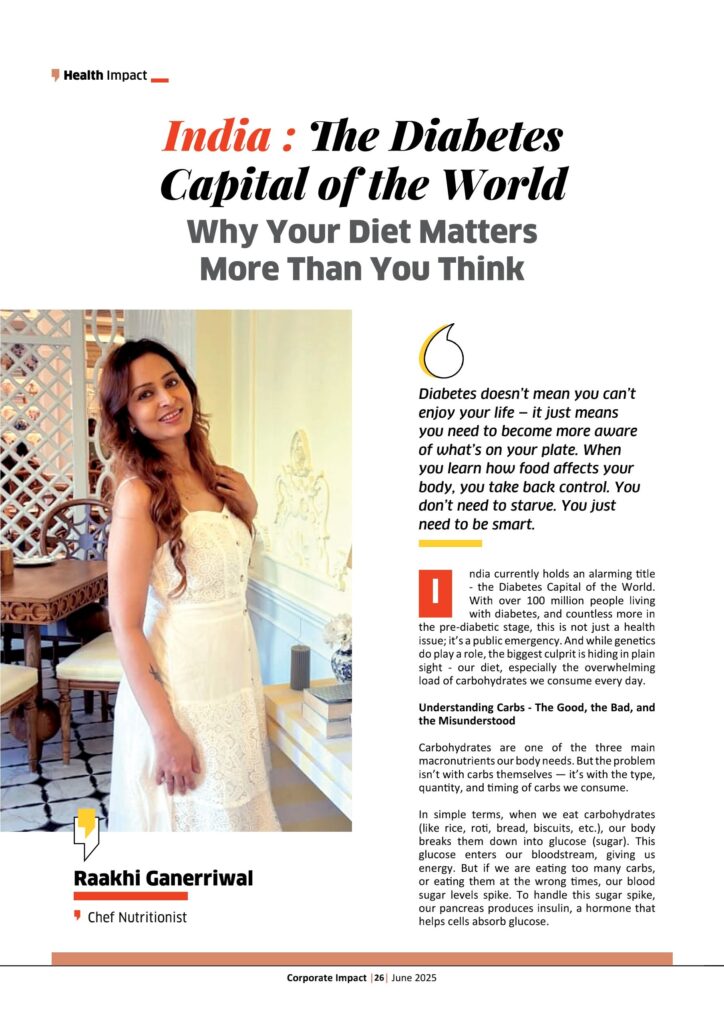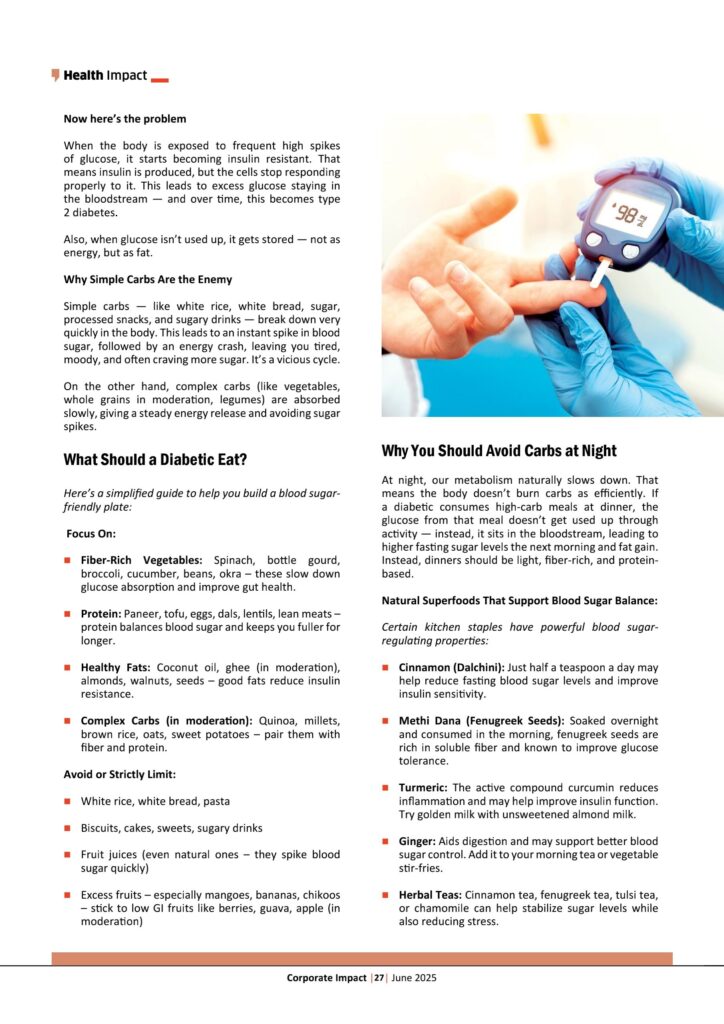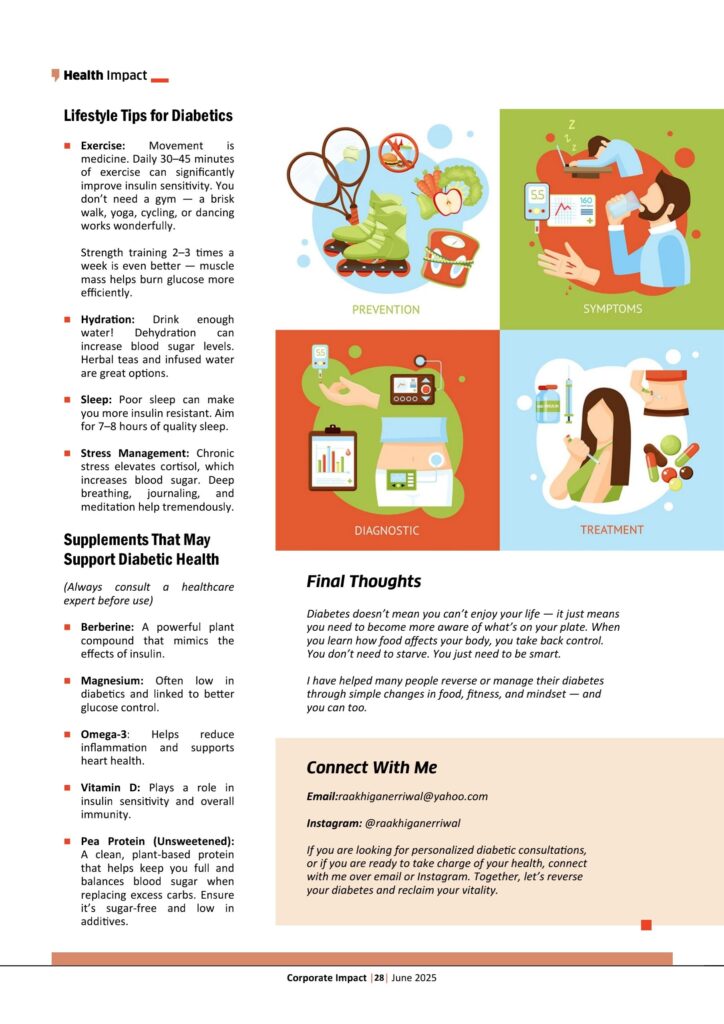Diabetes doesn’t mean you can’t enjoy your life — it just means you need to become more aware of what’s on your plate. When you learn how food affects your body, you take back control. You don’t need to starve. You just need to be smart.
Raakhi Ganerriwal
Chef Nutritionist
India currently holds an alarming title – the Diabetes Capital of the World. With over 100 million people living with diabetes, and countless more in the pre-diabetic stage, this is not just a health issue; it’s a public emergency. And while genetics do play a role, the biggest culprit is hiding in plain sight – our diet, especially the overwhelming load of carbohydrates we consume every day.
Understanding Carbs – The Good, the Bad, and the Misunderstood
Carbohydrates are one of the three main macronutrients our body needs. But the problem isn’t with carbs themselves — it’s with the type, quantity, and timing of carbs we consume.
In simple terms, when we eat carbohydrates (like rice, roti, bread, biscuits, etc.), our body breaks them down into glucose (sugar). This glucose enters our bloodstream, giving us energy. But if we are eating too many carbs, or eating them at the wrong times, our blood sugar levels spike. To handle this sugar spike, our pancreas produces insulin, a hormone that helps cells absorb glucose.
Now here’s the problem
When the body is exposed to frequent high spikes of glucose, it starts becoming insulin resistant. That means insulin is produced, but the cells stop responding properly to it. This leads to excess glucose staying in the bloodstream — and over time, this becomes type 2 diabetes.
Also, when glucose isn’t used up, it gets stored — not as energy, but as fat.

Why Simple Carbs Are the Enemy
Simple carbs — like white rice, white bread, sugar, processed snacks, and sugary drinks — break down very quickly in the body. This leads to an instant spike in blood sugar, followed by an energy crash, leaving you tired, moody, and often craving more sugar. It’s a vicious cycle.
On the other hand, complex carbs (like vegetables, whole grains in moderation, legumes) are absorbed slowly, giving a steady energy release and avoiding sugar spikes.
What Should a Diabetic Eat?
Here’s a simplified guide to help you build a blood sugar-friendly plate:
Focus On:
n Fiber-Rich Vegetables: Spinach, bottle gourd, broccoli, cucumber, beans, okra – these slow down glucose absorption and improve gut health.
n Protein: Paneer, tofu, eggs, dals, lentils, lean meats – protein balances blood sugar and keeps you fuller for longer.
Healthy Fats: Coconut oil, ghee (in moderation), almonds, walnuts, seeds – good fats reduce insulin resistance.
Complex Carbs (in moderation): Quinoa, millets, brown rice, oats, sweet potatoes – pair them with fiber and protein.
Avoid or Strictly Limit:
White rice, white bread, pasta
Biscuits, cakes, sweets, sugary drinks
Fruit juices (even natural ones – they spike blood sugar quickly)
Excess fruits – especially mangoes, bananas, chikoos – stick to low GI fruits like berries, guava, apple (in moderation)
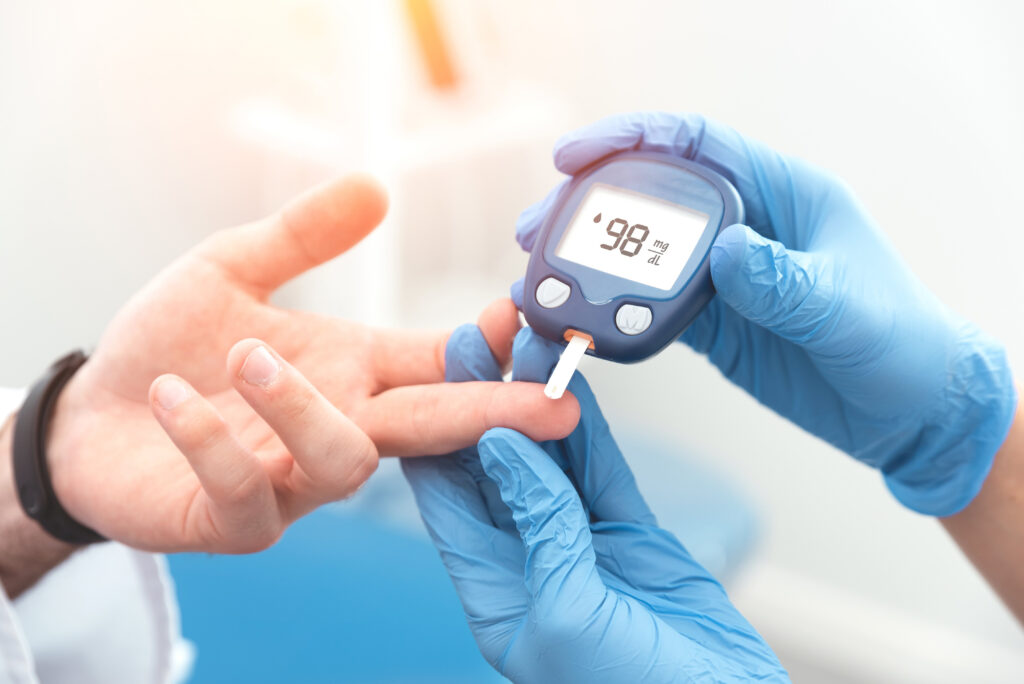
Why You Should Avoid Carbs at Night
At night, our metabolism naturally slows down. That means the body doesn’t burn carbs as efficiently. If a diabetic consumes high-carb meals at dinner, the glucose from that meal doesn’t get used up through activity — instead, it sits in the bloodstream, leading to higher fasting sugar levels the next morning and fat gain. Instead, dinners should be light, fiber-rich, and protein-based.
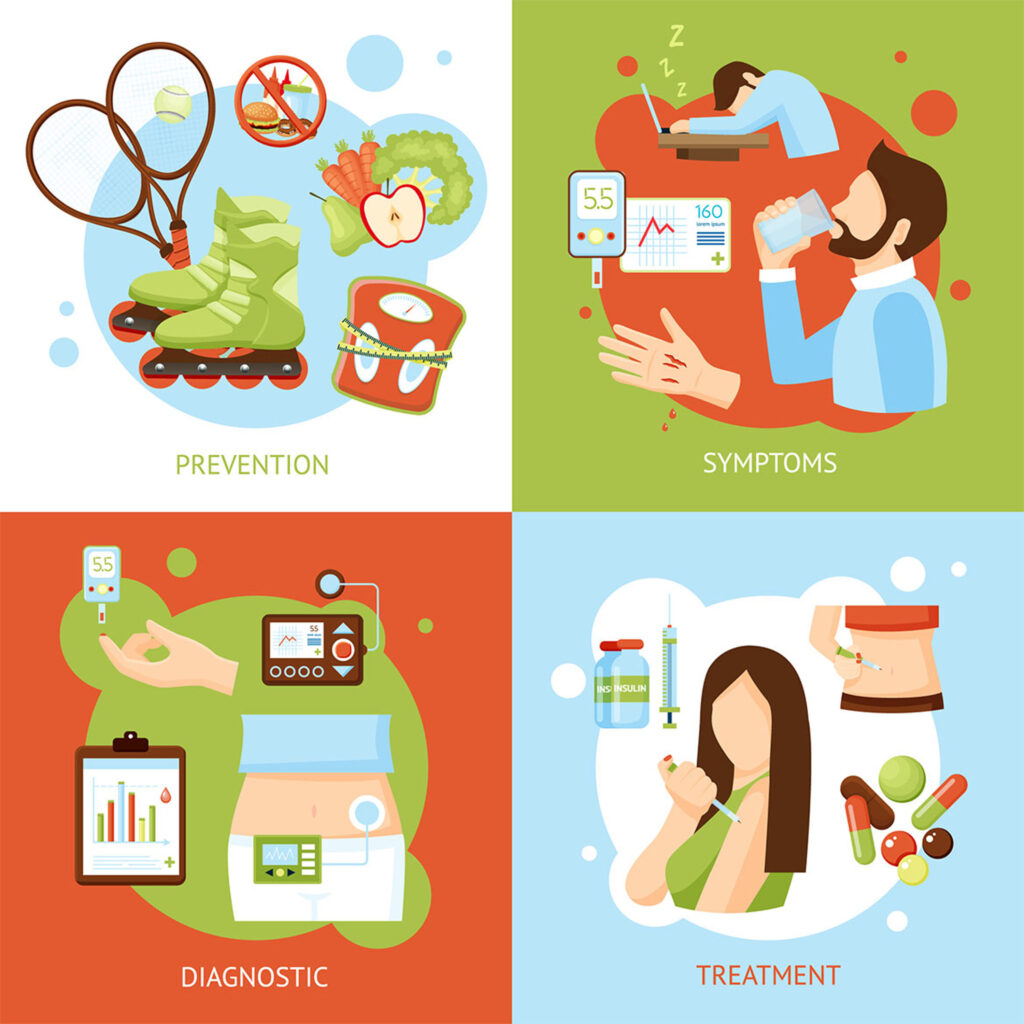
Natural Superfoods That Support Blood Sugar Balance:
Certain kitchen staples have powerful blood sugar-regulating properties:
Cinnamon (Dalchini): Just half a teaspoon a day may help reduce fasting blood sugar levels and improve insulin sensitivity.
Methi Dana (Fenugreek Seeds): Soaked overnight and consumed in the morning, fenugreek seeds are rich in soluble fiber and known to improve glucose tolerance.
Turmeric: The active compound curcumin reduces inflammation and may help improve insulin function. Try golden milk with unsweetened almond milk.
Ginger: Aids digestion and may support better blood sugar control. Add it to your morning tea or vegetable stir-fries.
Herbal Teas: Cinnamon tea, fenugreek tea, tulsi tea, or chamomile can help stabilize sugar levels while also reducing stress.
Lifestyle Tips for Diabetics
Exercise: Movement is medicine. Daily 30–45 minutes of exercise can significantly improve insulin sensitivity. You don’t need a gym — a brisk walk, yoga, cycling, or dancing works wonderfully.
Strength training 2–3 times a week is even better — muscle mass helps burn glucose more efficiently.
Hydration: Drink enough water! Dehydration can increase blood sugar levels. Herbal teas and infused water are great options.
Sleep: Poor sleep can make you more insulin resistant. Aim for 7–8 hours of quality sleep.
Stress Management: Chronic stress elevates cortisol, which increases blood sugar. Deep breathing, journaling, and meditation help tremendously.
Supplements That May
Support Diabetic Health
(Always consult a healthcare expert before use)
Berberine: A powerful plant compound that mimics the effects of insulin.
Magnesium: Often low in diabetics and linked to better glucose control.
Omega-3: Helps reduce inflammation and supports heart health.
Vitamin D: Plays a role in insulin sensitivity and overall immunity.
Pea Protein (Unsweetened): A clean, plant-based protein that helps keep you full and balances blood sugar when replacing excess carbs. Ensure it’s sugar-free and low in additives.
Final Thoughts
Diabetes doesn’t mean you can’t enjoy your life — it just means you need to become more aware of what’s on your plate. When you learn how food affects your body, you take back control. You don’t need to starve. You just need to be smart.
I have helped many people reverse or manage their diabetes through simple changes in food, fitness, and mindset — and you can too.
Connect With Me
Email:raakhiganerriwal@yahoo.com
Instagram: @raakhiganerriwal
If you are looking for personalized diabetic consultations, or if you are ready to take charge of your health, connect with me over email or Instagram. Together, let’s reverse your diabetes and reclaim your vitality.
